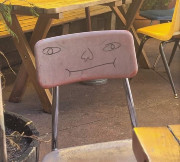|
I'm a producer and sometimes reporter with public radio, and have been with them for several years. I've also spent years studying the media and have a journalism degree. I know a lot about broadcast and print news from both media and audience perspectives. I can answer any questions people have about the media - why things are reported the way they are, questions of ethics and objectivity, etc. I can also answer any questions for journalism students or people who want to get into the world of news. If any more experienced media people want to answer questions as well, that would be great.
|
|
|
|

|
| # ? Apr 24, 2024 05:06 |
|
I have three years in the industry, and am more than willing to help with any questions as well.
|
|
|
|
Soulex posted:I have three years in the industry, and am more than willing to help with any questions as well.
|
|
|
|
How do I become a journalist? Do I just go to journalism school and then that's it? How does becoming newsman work?
|
|
|
|
N. Senada posted:How do I become a journalist? Do I just go to journalism school and then that's it? How does becoming newsman work? Some people go the blogging or independent publishing route to build a portfolio. I don't know how effective that is, but be aware that blogging can be shouting into the void. If you have the drive to keep it up and get your stuff out there it could be valuable. Journalism is a connections-based industry. Obviously talent and drive are very important, but those things have to be recognized. Who you know matters in having a chance to get your work seen. One of the big advantages to university journalism programs is that your instructors, if the program is good, are going to be people who either currently work in the industry or worked in it for a long time. You'll have places at the university to work, like the school newspaper. You'll have a chance to get internships, which can help (although internships obviously have ethical issues attached to them). That said, nobody in the industry cares about your degree. Nobody. They care about your portfolio. Do not graduate college without a strong portfolio. Save literally everything you do in classes, no matter how stupid. Every interview, every report, even if it never got published. Save everything. If, like me, you failed to save your writing, you're going to have a harder time making it. If you don't want to go the college route, get to know your local newspaper, radio, or TV stations. They're not likely to hire you as a reporter right away, since reporting jobs generally ask for several years of experience. But they will have positions that will let you get to know the industry - production, classified ad sales, etc. I got my start in production, and then had the chance to do some reporting. One of the benefits of going to school is having a chance to learn good ethical and legal practices. A good journalism program will teach you some media law, and you should have the principles of honest reporting driven into your head. But reporting is like any other kind of writing. Your natural abilities don't matter as much as your ability to keep up the work, hit deadlines, and stay focused. If you want to be a journalist, you can be. Just keep at it and build your experience and portfolio. Also be aware that the news media is very competitive, but the basic skills of journalism are good writing, the ability to meet deadlines, and people skills. These are applicable in a lot of different industries. A journalism degree doesn't guarantee a job, and like anybody graduating college now you're going to have a hard time, but if you're willing to sell yourself and show companies how valuable your skills are you can find work somewhere. FactsAreUseless fucked around with this message at 01:32 on Aug 18, 2014 |
|
|
|
If you want to be a news reporter, though, you need to find a newsroom to work for. This is a. going to give you steady income, b. give you an editor to make sure your pieces are accurate and up to the organization's standards, and c. give you the legitimacy you need to actually get people to talk to you. Also, many places no longer buy content from freelancers. But "freelancing," even if you aren't selling it, can help you build up your reporting portfolio (if you can get people to talk to you) and get hired. No matter where you go, be it radio, television, print, or the web, the skills are the same. You might need to learn a little different writing style or practice your voice work or learn how to stand on camera, but reporting and writing fundamentals remain the same. Write constantly. Not just reporting, but anything. Technical writing, fiction, everything is going to help you improve. And remember that you do not have the luxury of disinterest. A good journalist is a modern-day renaissance man. You have to be able to be interested in any subject, and write about it in a way that interests readers who know nothing about it.
|
|
|
|
How do you prepare your portfolio for applications? What do you emphasize or include, only relevant pieces or your most graceful essays or what?
|
|
|
|
N. Senada posted:How do you prepare your portfolio for applications? What do you emphasize or include, only relevant pieces or your most graceful essays or what? You can make something if you don't have it. Want to be a radio announcer but have no experience? Put together a few minutes of you reading fake copy or announcements you've heard on their station. Obviously you'll also have a resume, which is another place that working for school media benefits you, along with internships. You're not expected to have years of experience unless you're applying for an editor position or something. Organizations will train you, and you're going to have to relearn a lot whenever you go someplace new - everyone has different expectations. You just have to show that you can learn to do the work. FactsAreUseless fucked around with this message at 02:04 on Aug 18, 2014 |
|
|
|
FactsAreUseless posted:Do you work in sports reporting by any chance? It's a hugely important part of the industry I know nothing about. I do. It's far from national, though. Very local and 95% prep athletics.
|
|
|
|
I'm a TV photojournalist in one of the larger markets on the West Coast with more than 8 years experience. These threads never end up getting much attention for some reason but I hope we can get a megathread going. There's nothing like being on the front lines during breaking news.
|
|
|
|
Bio-Hazard posted:I'm a TV photojournalist in one of the larger markets on the West Coast with more than 8 years experience. These threads never end up getting much attention for some reason but I hope we can get a megathread going. Edit: Here's a few questions. - Do you also write and report on stories? I know the trend for a lot of news now is for reporters to also do their own photography, sound, and editing, rather than work in teams. Do you just do camera work? - Do you select stories, or is news judgement all your producers/editors/reporters? If so, what do you focus on? - Is most of what you do live or edited? Do you edit packages, or do you have another team for that? - How often are you on call? I'm mostly production so I get to keep a steady schedule. I've avoided becoming a full-time reporter so that I can avoid having to be constantly available. What's it like? - What has been your most interesting single experience so far? FactsAreUseless fucked around with this message at 11:27 on Aug 18, 2014 |
|
|
|
Have you ever read Flat Earth News by the peerless Nick Davies of The Guardian? If so, what did you think about it, and do you recognise some of the problems with journalism today. If you haven't, get it immediately and read it.
|
|
|
|
This is all great, by the way. What is the state of local, investigative journalism?
|
|
|
|
N. Senada posted:What is the state of local, investigative journalism? Not as robust as it should be. Newsrooms are shrinking and have been for years. Whomever is left is increasingly asked to do more with less and it can cut into the time it really takes to dig into something that won't have a press released issued on it. In my city, there are two news or news/talk radio stations, three daily papers, four television networks and a dozen or so smaller newsrooms. Of those 20-ish newsrooms, only two always have a reporter at local government meetings. Not that City Hall reporting is that investigative, but it will give you a sense of how spotty coverage can be. National investigative reporting is doing a bit better, but not a whole lot. Canada's oldest television newsmagazine show just had it's run cut back from 23 to 14 episodes. It isn't for lack of content, rather people just don't seem to be interested in watching it or at least advertisers don't appear to be willing to pay for the people that are watching it. To some degree (and maybe hopefully to a larger degree in the future) bloggers and whatnot are taking over this role. Access to information laws make it relatively easy to get information that can help start an investigation of some sort. People like those over at Project Censored are still doing the digging, but they aren't terribly likely to focus on shenanigans with your local zoning committee.
|
|
|
|
thehustler posted:Have you ever read Flat Earth News by the peerless Nick Davies of The Guardian? - Truly great reporting has always been rare. People like to idolize the past of journalism in America. Edward R. Murrow, the Watergate investigations, etc. But the truth is that Murrow also did a lot of entertainment interviews and fluff pieces. His show's McCarthy reporting was a stand-out. Likewise for the Watergate investigations. Overall, journalism in the U.S. in the latter half of the 20th century is much strong than in the first half, thanks to things like Supreme Court cases making it much harder for public figures to sue papers for libel. Even then, look at how the Cold War was mostly reported. Look at the overwhelming support for entering Vietnam, the complete failure to report the extent of the CIA's actions in South and Central America during the 50s-80s. Reporting is not an easy task, and there is little reward for sticking your neck out. Journalists are overworked, underpaid, and have to be risk-averse. If you write a bad story or report something inaccurate, you risk your job, your entire future career, and a potential libel suit. Great investigative work has always been rare. - Right now, reporters are producing some of the best stories ever written. Look at the amount of amazing reporting that is out there. Advocacy organizations like Democracy Now, foreign coverage from NPR, the BBC, and Al Jazeera, long-form domestic pieces in magazines and broadcast news programs like PRI's This American Life. There is some amazing reporting happening, and that has happened in the last decade. One of my favorite investigative pieces of the past few years is the Tainted Justice series from the Philadelphia Daily News. The internet affords a newfound freedom to those who are willing to take risks and investigate. It can also give reporters a platform to get stories out that is not beholden to advertisers or corporate interests. - Right now, reporters are producing some of the worst stories ever written. That internet freedom cuts both ways. There is a lot of trash out there. Tabloid journalism has seen a resurgence. Some reporters, especially bloggers, are not accountable to anyone. Others work for organizations whose ethical standards are lacking. Worse yet, a lot of what is out there is just empty. Clickbait, listicles, 15 Crazy Things You Won't Believe About Michelle Obama's Vagina. News sites aggregate from other news sites, and getting the click is sometimes of more value than getting people to actually read your story - or care. News organizations always borrowed from each other. Davies writes about the failure of journalists during the Y2K hysteria. Part of the reason for that is that news organizations echoed each other. Nobody wants to miss a story, and there's a lot more risk (and work) in questioning another source rather than just reporting it. Journalism is pretty tight-knit. Major reporters know each other and have likely worked together. They may have no reason to double-check each other. Especially when there's more value in trying to break a story rather than waste time on something that's already been reported. (You can see something similar in scientific journals - the pressure to publish new studies means that some are not receiving the repetition and rigor they should. You can't get famous seeing if somebody else's work is repeatable). The internet makes that all worse. - Right now, there is too much news out there. This is a direct result of points 1 and 2. There is just too much news. 24-hour news channels need constant new material, and digital pressures mean even organizations that do not run news 24-hours are forced to keep their website constantly updated. It's harder and harder to find time to double-check a story, be thorough, get it edited. You have to report constantly. Accuracy takes a backseat to speed. If something's wrong, well, that's just more news. And the cycle is so fast that mistakes are quickly forgotten. From an audience perspective, this means it's impossible to keep up. You can't consume the amount of news that is out there. How do you judge what news sources are worthwhile? How do you have time to keep up? Most people are not active consumers of media, let alone informed and educated ones. - We're reached a point of information saturation. Billboards, road signs, work, home, food labels, the radio, TV, the internet, people's voices, a headline on a magazine at the checkout. You are constantly bombarded with words and information. Your brain will try to process all of this whether you want it to or not. But you have a limited capacity to process information. This means that a lot of what you "know" is information you know without ever having learned it. You picked it up. It's an amalgamation of everything you've seen and heard, put together by your brain's subconscious desire to find patterns and make sense of things. In 2004, three-quarters of Americans believed Saddam Hussein had WMD. Few news sources were reporting this. They reported "Saddam Hussein has no WMD. We have learned Hussein has no WMD. No WMD for Hussein." But people can't keep up. The brain doesn't hear negatives. That reporting was heard as "Hussein. WMD. Iraq." People just knew, without any idea why, that Hussein had WMD. - Few people know how to consume media. Being a media consumer is just as difficult as being a producer. Think of the messages you hear from childhood. TV shows, advertising, music, movies, whatever. Not even counting the news, you are assaulted from birth with conflicting information. Do you know how to analyze it? To find patterns, to find themes, to understand characters and plots and the messages in everyday popular culture? Of course not. And most adults don't either. We teach our children that literature is full of subtext, great depth, and can be analyzed. Then they go out and believe that only applies to literature. We need to be teaching children not just how to understand literature, but how to understand all media. We need to be applying those English class techniques more broadly. Basically, there's too much news, too much pressure to produce news, and the American public can't keep up. It's physically impossible. We are not giving people the tools they need. Edit: This American Life is no longer with PRI. They are now distributed by PRX. FactsAreUseless fucked around with this message at 18:05 on Aug 18, 2014 |
|
|
|
Several news outlets in the Seattle area are suing for access to surveillance video of a school shooting (possibly NSFW ads). What are the odds they get the video, watch it, and decide not to air it out of a sense of decency?
|
|
|
|
Thanatosian posted:Several news outlets in the Seattle area are suing for access to surveillance video of a school shooting (possibly NSFW ads). What are the odds they get the video, watch it, and decide not to air it out of a sense of decency? Edit: That said, I wouldn't be surprised if we see stills or short clips, and there will be (and should be) discussion of it. Even the discussion of whether to run it is newsworthy.
|
|
|
|
Apparently Sports Illustrated decided to fire their writers who didn't create a healthy enough environment for their advertisers. I guess this is where journalism is in America.
|
|
|
|
FactsAreUseless posted:Do you work in sports reporting by any chance? It's a hugely important part of the industry I know nothing about. I'm a sports photographer currently studying for this field. It is more of a jack of all trades role. I am a broadcaster for the military (in the military) and do everything from boring tv stories to radio stories, to other fun news pieces. I won a few of the journalism awards the military offers, missed the more prestigious one sadly. Best sports story for all armed forces (I did win Army). All of this intermixed with being on air talent for a daily 4 hour radio show. So I can help out some with what I know.
|
|
|
|
Bip Roberts posted:Apparently Sports Illustrated decided to fire their writers who didn't create a healthy enough environment for their advertisers. I guess this is where journalism is in America. The modern state of mainstream media is horrible. A lot of industries will commission some people instead of having a dedicated reporter. This creates a lot of supply and little demand. The old mantra "If it bleeds, it leads" still goes strong, sadly. Ever thought about how many good news stories you've heard recently? They don't sell as well as a murder on 5th or whatever. If you are looking into this field, it's very very competitive, and the smallest things count. If you don't have the drive, the passion, and the ability to have a thick skin, you won't make it far.
|
|
|
|
Soulex posted:The old mantra "If it bleeds, it leads" still goes strong, sadly. Ever thought about how many good news stories you've heard recently? They don't sell as well as a murder on 5th or whatever. Edit: I should say not primarily ad-driven. As federal funding decreases you hear more on-air underwriting and see more web sponsors, but most of the money still comes from donations. FactsAreUseless fucked around with this message at 21:20 on Aug 18, 2014 |
|
|
|
FactsAreUseless posted:I would be interested in hearing about how you do breaking news coverage, since that isn't really something public radio is set up to do - definitely not at the local affiliate level. Hear about it on the scanner or press release, drive to it, shoot it, edit it, send it back through some means, go live if possible... That's pretty much it. FactsAreUseless posted:- Do you also write and report on stories? I know the trend for a lot of news now is for reporters to also do their own photography, sound, and editing, rather than work in teams. Do you just do camera work? I could write since I have a J-School degree but I enjoy video so I do that instead. I use twitter and I'm sure within a few years we'll all be writing for the web. Big markets still have divisions of labor, which is a GOOD THING. Most small markets use MMJs (Multi-Media Journalists) and only a few people are good enough to write, shoot and edit. Think about this: - How many people do you know that are stellar journalists, that can also operate techy photo and computer equipment and do it within a 6-8 hour deadline, and do it well? - Then think about how many people would continue to do TV news when they could easily earn 50% more money by getting a PR job. Most people want to have families and time with friends. The people who don't are in TV news. FactsAreUseless posted:- Do you select stories, or is news judgement all your producers/editors/reporters? If so, what do you focus on? My opinion doesn't matter, but I can still give tips and ideas. I have no editorial control for the selection of stories but an incredible amount of control for the final product. FactsAreUseless posted:- Is most of what you do live or edited? Do you edit packages, or do you have another team for that? Shooting video is about 4 hours of the day. Writing and editing is about 2.5 hours of the day. Driving is about 1 hour of the day. Each live shot is about 2 minutes long, the stories are 1 minute 30 seconds of that. We usually do 3 live shots, one for each show. I do everything except write. FactsAreUseless posted:- How often are you on call? I'm mostly production so I get to keep a steady schedule. I've avoided becoming a full-time reporter so that I can avoid having to be constantly available. What's it like? It's different for each station. I'm not technically on call but I get called occasionally. FactsAreUseless posted:- What has been your most interesting single experience so far? I do something different each day, I can't really say that I have one favorite experience. I have a lot of great stories, though.
|
|
|
|
The PR job The deadlines are bad sometimes. Luckily. I have super lax deadlines, but my stories are not very news worthy (subject, not presentation). But you hit it on the head. I remember being in a state of constant panic when my station made the switch from Avid to premiere.
|
|
|
|
Bio-Hazard posted:Hear about it on the scanner or press release, drive to it, shoot it, edit it, send it back through some means, go live if possible... That's pretty much it. Just wait until your municipality switches over to digital police radios as then you won't have it at all! Anyway, here's a bit from a doc about a radio station with style of news you have almost certainly never heard: http://youtu.be/BDCdbmwy9l8?t=3m45s After the writing bit they talk about how they used to generate leads from the public; very cost effective.
|
|
|
|
Soulex posted:The PR job Being a reporter is a little like being a public school teacher. You're stressed out, you're underpaid, you're constantly wondering if you're going to get fired, everyone hates you, everyone thinks they can do their job better than you, you're probably an alcoholic, and you should have been smart enough to be an engineer like your father and now you're disappointing everyone. This is why I went into production instead. At least I get to leave my job at the end of the day.
|
|
|
|
Given the slow decline of print media, is there any hope for its salvation, or do you think that outside of several large national papers like the NYT and WSJ we'll see newspapers die altogether? Or will even they be online only in 20 years?
|
|
|
|
Volmarias posted:Given the slow decline of print media, is there any hope for its salvation, or do you think that outside of several large national papers like the NYT and WSJ we'll see newspapers die altogether? Or will even they be online only in 20 years? Well it is true that print is dying there is still a demand for local news and coverage for things happening in small towns. I think it is likely that the middle ground will go away. There will be big outlets and small local outlets but not a lot in between.
|
|
|
|
Volmarias posted:Given the slow decline of print media, is there any hope for its salvation, or do you think that outside of several large national papers like the NYT and WSJ we'll see newspapers die altogether? Or will even they be online only in 20 years? Looking back at the archives of where I work, the paper used to be 90% national news. It was and is a small daily. Of course, the only competition were a couple of statewide papers and a single TV station 30 miles away that came in fuzzy. It was actually an awful paper, filled with a mishmash of national news that should be there and various shock stories off the wire. There's been a big push for community journalism. Everyone's looking to it as their saving grace. And paywalls. In the early days of online newspaper content, it was either really limited or behind a paywall. It was then loosened up considerably for several years and now many are going back to a paywall. Where I work instituted one a few months ago (IP-based, so, yeah). But as mentioned earlier, advertising is the major problem. I mentioned earlier about our competition back in the day. The closest locally was that fuzzy TV station. There was no other way to advertise and even national chains spent money on newspaper advertising. National is almost a no-go now because that decision isn't made locally. I'm trying to think of any national ads we run and am positive we don't. We're forced to rely on the same group over and over for not just pages, but for whatever special inserts. We also now have a good radio station, TV is more than capable of personalizing the ads for local cable, the internet is increasing its presence and everybody can get a Facebook account.
|
|
|
|
FactsAreUseless posted:People like to talk about how bad the news is, and I like to remind them that the people who are paid to manipulate the news - the marketers, the PR people, the pundits, the speechwriters - are better paid and have more job security and more up-to-date training than the reporters and editors. This is true. I can't imagine what it would be like to just be able to have to be able to do just one aspect of the job like production. I have to plan (sometimes), coordinate, shoot, voice, edit, and produce everything. It's good because it's a lot of experience and a lot of creative control. I'm mainly leaning towards to PR because like you said, better job security, better pay, and not nearly as much stress. When I retire (the plan anyways) from the military in 10 odd years, I should have my degree in Sports Journalism and enough experience to be able to some what walk onto a job. Veteran's preference should help too. I will also mention that I have no knowledge of civilian media at all besides technical aspects like camera work, story angles and the like. My experience is all military, which isn't too different, it's just a lot more propaganda pushing because we need to include certain messages and themes pushed up by higher. My challenge is turning that into something that someone would watch. I would post some examples, however, while I've already been doxxed before, I'd prefer not to post any videos that include my name. I prefer my privacy.
|
|
|
|
Volmarias posted:Given the slow decline of print media, is there any hope for its salvation, or do you think that outside of several large national papers like the NYT and WSJ we'll see newspapers die altogether? Or will even they be online only in 20 years?
|
|
|
|
Can you tell me about "hate pieces" in tabloids? I have a friend who works for the Daily Mail online team who hates his life and says these things exist. Basically, "write 700 words to piss off the lefties and get pagewviews."
|
|
|
Clamps McGraw posted:Can you tell me about "hate pieces" in tabloids? I have a friend who works for the Daily Mail online team who hates his life and says these things exist. That sounds like a literally "professional troll".
|
|
|
|
|
Clamps McGraw posted:Can you tell me about "hate pieces" in tabloids? I have a friend who works for the Daily Mail online team who hates his life and says these things exist. Tabloids pretty much exist due to a couple weird things about American journalism (although some of this obviously applies abroad, but I really know nothing about foreign journalism laws). One of the big ones is that it's very hard to be sued for libel, especially by public figures. This is a good thing - stricter libel laws stifled good reporting in the first half of the 20th century. There also is no official licensing or label for being a journalist or a news source in America. This is also a good thing (mostly). It means there's a variety of voices, and you can't censor someone by saying they're not legitimate media. Here's what you have to do in the U.S. to be an Official Real-Life News Reporter Like In The Movies, Really! 1. Write or record something and publish it with a claim that it is true. Congrats, you are now a journalist. Welcome to the world of media. Please use your powers for good, because legally it is very hard to stop someone from using their powers for evil.
|
|
|
|
To expand on the local newspaper survival that people discussed above, we're seeing something similar in commercial radio. In the 90s, Clear Channel bought up every local station they could get their hands on. Conservative talk is huge, Clear Channel is doing great. Cut to the late 2000s. Turns out actually making a profit on a small local station is difficult, especially when a large portion of the audience hates your format, your music, and your talk. Clear Channel starts selling off a lot of their smaller stations to independent producers. Meanwhile, public radio continues to thrive in the age of the internet, because we are smart and beautiful (and our business model works better in the internet era).
|
|
|
|
Clamps McGraw posted:Can you tell me about "hate pieces" in tabloids? I have a friend who works for the Daily Mail online team who hates his life and says these things exist. Punch him in the cock from all of us.
|
|
|
|
How accurate is this quote: There is no such thing, at this date of the world’s history, in America as an independent press…If I allowed my honest opinions to appear in one issue of my paper, before twenty-four hours my occupation would be gone. The business of journalists is to destroy truth — we are the tools and vassals of rich men behind the scenes. John Swinton, Journalist for The New York Times, New York Sun (1880)
|
|
|
|
jacobs posted:How accurate is this quote: It's true now, it was true when he wrote it, and it was true when America started. It will be true tomorrow. There is no grand conspiracy to control the media, and there doesn't need to be. Let's examine. - The independent and free press is an ideal, not a reality. The free press is a fictional construct, an ideal to aspire to. This is also true for our justice system, our democratic government, our education system, etc. An independent press would mean a press free of influence, bias, or financial incentive. It would require that reporters be unpaid, that all news be freely accessed and available, and that nobody attempt to influence the news - or that all reporters be arbiters of truth above that influence. It's never going to happen. The news costs money to produce, it costs money to pay the reporters, it costs money to distribute, and if someone wants to make any profit of it that's more financial pressure. That money has to come from somewhere. We'll get into our options below. Note also how hard it is to attract talent to the news - my points above about the low pay, high pressure, risk aversion, and lack of benefits apply. It's just not going to happen. - Somewhere between 5 and 6 conglomerates control 90 percent of the media. It fluctuates. And I don't mean just the news media - all radio, television, film, book publishing, newspapers, music. All the media. Last I checked (circa 2010) it was News Corp, Viacom, Time Warner (now Comcast? I don't know if they bought out all of Time Warner or just their cable distribution), Bertlesmann (a German company, but I believe they're no longer among the big 5), Disney, and uh... Sony, possibly? Wikipedia lists: "Viacom, CBS Corporation, Time Warner, 21st Century Fox and News Corp (the former News Corporation, split in 2013), Bertelsmann AG, Sony, Comcast, Vivendi, Televisa, The Walt Disney Company, Hearst Corporation, Organizações Globo and Lagardère Group." But they don't give a sense of the distribution. Either way, it is not a large number of companies. - There has never been a free press. The earliest American papers were the partisan press. Basically people printing newsletters telling other people (white male landowners) how they should vote. Revolutionary papers, loyalist papers, Federalist papers, Anti-federalist papers. The idea of the independent press is relatively new. When Swinton wrote that, most of the national press was a handful of major papers owned by people like William Randolph Hearst, a man who faked a terrorist attack so that he could help start a war to sell more newspapers. That's not a conspiracy theory or exaggeration. The only reason we have the idea of a free press is that reporters a. recognized that it was a public good, and gave up a lot to pursue it and b. papers were able to gain a reputation for being free and independent - it was something that people had started to care about. - It's very easy to manipulate the press. Forget about the financial pressures of advertising, profitability, and corporate ownership for a second. Reporters depend on access to people in positions of power and influence to actually write their stories. They rely on press releases (something I take issue with), but more than that they have to be friendly with their subjects. The media, contrary to popular belief, does not wield a lot of power. If you alienate the people who make the news, they will not let you speak to them. This makes your job much, much harder. A good illustration is the White House Press Corps. The White House, and this was as true under Bush as Obama, will take away your press pass if you make them angry. They tend not to target major news sources, because that could cause a stink, but they also seriously limit smaller independent journalists from having access. It's not just the government, it's all levels of media. And, as I mentioned above, there are PR and marketing people who have as much journalism training as reporters who are paid much better, are under less stress, and get better benefits to manipulate the news. There are more of them than there are of us. The journalist/teacher comparison is accurate - both are essential to society, underpaid, overworked, and widely reviled for the failures of their respective systems. - Good reporting is not popular reporting. Sing along if you know the words: "Why do they spend so much time on [Paris Hilton/Britney Spears/Donald Trump/The Bachelorette/John And Kate/More Recent Reference], who wants to see that?" You know what sells? Entertainment news. Sports news. Celebrity gossip. Tabloids. Commentary. Punditry. Talk radio. You know what doesn't sell? Really serious in-depth investigative reporting. Think about the number of people who buy tabloids. It's a serious number. There is nothing of substance in them, but this is where people get their information. Think about all the terrible local news scare stories, the car crashes, the kidnapped white girls on Nancy Grace. The reason there is so much of this is because it's what you want to see. You asked for it, so we gave it to you. You tuned in day after day after day to the worst things the media has to offer, and now CNN reads tweets on the air. Why? Because you wanted it. It's not your fault. Like I said earlier, trying to be a good media consumer is overwhelming, often impossible. People aren't taught what good journalism is, they don't value it, it doesn't sell. And because of those corporate interests and the profit motive mentioned above, there's more and more pressure to produce what does sell. 15 Crazy Reasons Why All The News Seems To Suck Now. - Media organizations are beholden to a wide range of conflicting interests. Look at all the groups we just talked about with a stake in the news media. In the media as a whole, not just the news. (And entertainment is powerful, it influences people's opinions just as much, perhaps more, especially as children.) It's not just the corporations that own the news stations, or those in positions of power trying to manipulate the media, or the editors, or the interests of the reporters themselves, or the audiences. It's all of these things. There is little reward in being a great reporter. Swinton saw that - if he'd spoken out, he would have lost his job. There aren't many people who value what you do, and there's a lot of them who will try and see that you lose your job if you do something they don't like. So how do we remove all these influences from our reporting? We have to value the news as a public service. We could make it all non-profit, so that the financial incentive is not to be profitable, but to use your funding to create great content. But some would argue that the lack of profit motive would simply make news less available. Who wants to work for little money? Who wants to run a news organization that can't profit? Who wants an unprofitable enterprise as part of their conglomerate? One of the most important things we can do is weaken the influence of the powerful by making their jobs much harder. Once again, it comes back to teaching media literacy. If people understand when they're being manipulated, when the news is worthless, when an organization is unethical, they can choose to consume better media. They can pressure the people in power. They can stop buying tabloids, watching entertainment stories, getting sucked into Nancy Grace crime dramas. If people stop wanting poo poo, selling poo poo stops being profitable. Obviously not all the pressure is on consumers. We need to make it so that news reporters and journalists are paid well enough to attract real talent, we need to make sure they're free to report the news (while enforcing good ethical standards), and we need to make sure ethical policies are in place that all journalists will follow. See the Time/Sports Illustrated story above. The correct response is to stop buying SI. Reporters should refuse to work for Time. They should be starved of resources until they can act ethically. Edit: Removed the last sentence because this already reads like a lovely college essay, because apparently I have forgotten how to write. Edit 2: Trying to remove some of the financial pressures is why I'm in favor of donation-based funding for news, but that still comes with some issues - namely that it's never sufficient, so you still wind up beholden to advertisers, universities, or other government organizations, and you either let your audience dictate your news (by forcing you to report what they want or else withhold funding) or you have to try and convince them that your news is worthwhile. Either way, donation-based news always ends up with a small group of dedicated donors and listeners, rather than reaching the large audience despite not having a subscription cost. Commercial news just has a better ability to reach a wider audience. FactsAreUseless fucked around with this message at 02:38 on Aug 20, 2014 |
|
|
|
N. Senada posted:How do I become a journalist? Do I just go to journalism school and then that's it? How does becoming newsman work? I got my BA in history but while I was a student I worked at the college paper as a writer for three semesters and an editor for one. During the summers I did two radio news internships one at a Clear Channel station and another at a public radio station. I did not really make an prrofessional connections or network. I went to a couple job fairs but did not land anything After I graduated I got a job at a very small newspaper in Indiana. I think it may have been through a cold or unsolicited application but I do not remember. I did a lot of those. I worked there one year as a general assignment reporter and then got a job covering the capitol Frankfort in Kentucky. It was for another very small local paper but Frankfort is a small town. There were only 2 or 3 other full time capitol reporters and maybe a few more came in during the legislative session. I dont know how I got that job since I had basically no experience covering state government. I did that job for five years and then quit to go back to graduate school in history. From one sinking ship to another. Whatever I do next stay away from that because I make a lot of really bad career decisions.
|
|
|
|
space pope posted:I got my BA in history but while I was a student I worked at the college paper as a writer for three semesters and an editor for one. During the summers I did two radio news internships one at a Clear Channel station and another at a public radio station. I did not really make an prrofessional connections or network. I went to a couple job fairs but did not land anything
|
|
|
|

|
| # ? Apr 24, 2024 05:06 |
|
If you're talking about graduate history, don't worry I already did that. E. srsly, good luck with it.
|
|
|


















